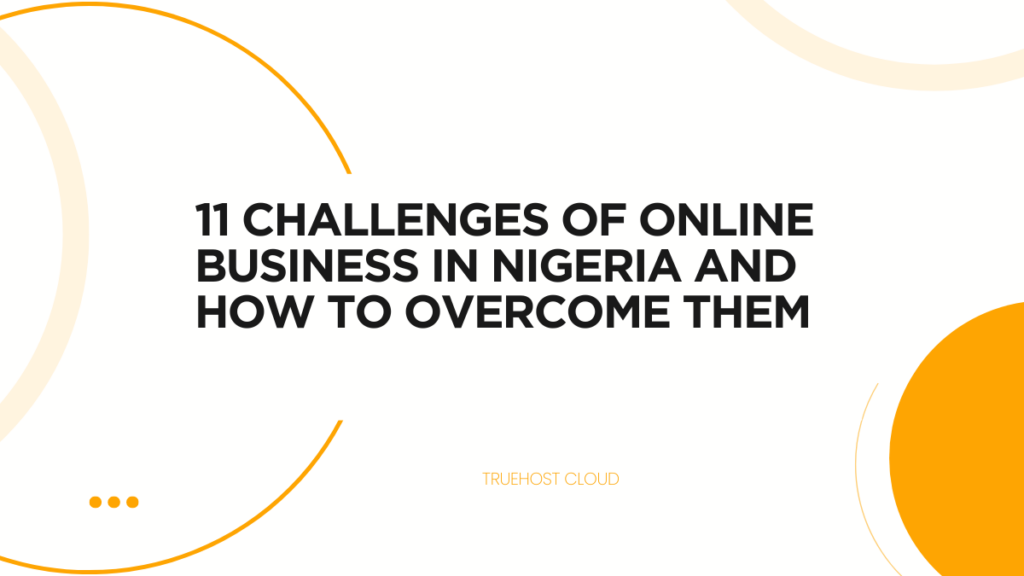Nigeria’s e-commerce market has immense potential, with a large population and growing internet penetration. However, running an e-commerce business in Nigeria comes with its own set of unique challenges. In this post, we’ll explore 11 key challenges of online business in Nigeria and discuss strategies to overcome them.
Online Business Stats in Nigeria
The Nigerian e-commerce market is rapidly growing and has immense potential for further expansion. Here are some key statistics showcasing the current state and growth trajectory of online business in Nigeria:
Market Size and Growth:
- The Nigerian e-commerce market is estimated to be worth US$8.53 billion in 2024 and is projected to reach US$14.92 billion by 2029, growing at a compound annual growth rate (CAGR) of 11.82%.
- Revenue in the e-commerce market is expected to reach US$6.40 billion in 2024 and is projected to grow at a CAGR of 9.34%, resulting in a market volume of US$10.00 billion by 2029.
Internet Usage and Online Shopping:
- 89% of internet users in Nigeria make purchases online, with an additional 24% planning to do so in the near future.
- Internet penetration in Nigeria has increased by 4.6% in the past year, with internet speed increasing by 39%.
- 87.9% of online marketplace visitors in Nigeria access platforms through mobile devices.
Payment Methods:
- Despite the growth of e-commerce, 65% of payments in Nigeria are still made in cash. However, digital payment options are gaining traction.
Industry-Specific Sales:
- Business & Industrial is the largest e-commerce category in Nigeria, accounting for 23.29% of total online sales.
- Other leading categories include Jobs & Education (3.72%), Consumer Electronics (2.41%), and Fashion & Apparel (1.81%).
Challenges and Opportunities:
While the Nigerian e-commerce market is thriving, challenges such as infrastructure deficiencies, online payment trust issues, and logistics hurdles still persist. However, the growing internet penetration, rising middle class, and increasing adoption of digital payments present significant opportunities for e-commerce businesses to expand their reach and increase sales in Nigeria.
1. Limited Internet Access and Slow Speeds
One of the core challenges faced by e-commerce businesses in Nigeria is limited internet access and slow speeds. This can make it difficult for consumers to shop online and hinder the growth of e-commerce in Nigeria.
To overcome this challenge, e-commerce players should:
- Optimize their websites for fast loading times
- Offer mobile-friendly versions of their sites
- Partner with telecom providers to offer subsidized data plans
2. Low Trust in Online Shopping
Many Nigerians don’t trust online sites, which makes it challenging to drive adoption of online shopping. Concerns about fraud, product quality, and delivery reliability contribute to this lack of trust in online shopping.
To build trust, e-commerce businesses should:
- Provide clear information about products, pricing, and shipping
- Offer secure payment options and protect customer data
- Use customer reviews and testimonials to build credibility
- Partner with trusted brands and influencers
3. Logistical Challenges
Nigeria’s infrastructure and logistics network can pose significant challenges for e-commerce businesses. Poor road conditions, unreliable postal services, and lack of standardized address systems make it difficult to ensure timely and reliable delivery.
To navigate these challenges, businesses can:
- Partner with reliable logistics providers
- Invest in their own delivery fleet
- Use technology to optimize routes and track shipments
- Offer flexible delivery options like pickup points
4. Payment Challenges
Online payment adoption is still relatively low in Nigeria, with many consumers preferring cash on delivery. This can create cash flow challenges and increase the risk of returns for e-commerce businesses.
To encourage online payment, businesses should:
- Offer multiple secure payment options
- Educate customers about the benefits and security of online payment
- Partner with trusted payment gateways
- Incentivize online payment through discounts or loyalty programs
5. Inadequate Addressing System
Nigeria lacks a standardized addressing system, which can make it difficult for e-commerce players to efficiently deliver products to customers. Many areas lack proper street names and numbers.
To work around this issue, businesses can:
- Use descriptive addresses and landmarks
- Partner with local logistics providers familiar with the area
- Invest in geocoding technology to map out delivery locations
- Engage customers to provide detailed delivery instructions
6. Limited Access to Funding
Access to funding can be a challenge for e-commerce startups in Nigeria, particularly for small players. Traditional banks may be hesitant to lend to online businesses, and venture capital is still nascent.
To secure funding, e-commerce entrepreneurs should:
- Bootstrap and reinvest profits in the early stages
- Seek out angel investors and startup accelerators
- Explore crowdfunding platforms
- Pursue strategic partnerships and joint ventures
7. Inadequate Power Supply
Nigeria’s inconsistent power supply can disrupt e-commerce operations, from running warehouses to powering data centers. This can increase operating costs and impact reliability.
To mitigate power challenges, businesses should:
- Invest in backup power solutions like generators and solar systems
- Optimize energy usage through efficient equipment and practices
- Consider distributed warehouse locations to spread risk
- Partner with reliable data center providers
8. Cybersecurity Concerns
As online business grows in Nigeria, so do concerns about cybersecurity. E-commerce platforms need to protect customer data, prevent fraud, and ensure secure transactions.
To enhance cybersecurity, businesses should:
- Implement strong encryption and security protocols
- Regularly update software and security measures
- Train employees on cybersecurity best practices
- Work with reputable cybersecurity providers
9. Talent and Skill Gaps
Finding skilled talent in areas like web development, digital marketing, and data analytics can be challenging for e-commerce businesses in Nigeria. There is a need to develop a talent pipeline to support the growth of the industry.
To bridge skill gaps, businesses can:
- Partner with educational institutions to develop relevant curricula
- Offer internships and apprenticeships to nurture talent
- Provide on-the-job training and skill development programs
- Leverage freelance and remote talent pools
10. Regulatory Challenges
Nigeria’s regulatory environment for e-commerce is still evolving, with uncertainties around taxes, consumer protection, and data privacy. Navigating these regulations can be complex for online businesses.
To stay compliant, businesses should:
- Stay informed about relevant laws and regulations
- Seek legal and tax advice from experienced professionals
- Engage with industry associations to advocate for favorable policies
- Implement robust compliance and risk management processes
11. Competitive Landscape
Nigeria’s e-commerce market is becoming increasingly competitive, with both local and international players vying for market share. Standing out in this crowded space requires a strong value proposition and differentiation strategy.
To succeed in a competitive market, e-commerce businesses should:
- Focus on niche segments or unique product offerings
- Prioritize customer experience and service
- Invest in branding and marketing to build awareness
- Continuously innovate and adapt to changing customer needs
While the challenges of running an e-commerce business in Nigeria are significant, so are the opportunities. By proactively addressing these challenges and implementing effective strategies, online businesses can tap into Nigeria’s vast potential and drive the growth of e-commerce in Nigeria.
| Challenge | Potential Solutions |
|---|---|
| Limited Internet Access | – Optimize for fast loading – Offer mobile-friendly sites – Partner with telecoms |
| Low Trust in Online Shopping | – Provide clear information – Offer secure payments – Use reviews and testimonials |
| Logistical Challenges | – Partner with logistics providers – Invest in delivery fleet – Offer flexible delivery options |
| Payment Challenges | – Offer multiple payment options – Educate on online payment security – Incentivize online payment |
| Inadequate Addressing System | – Use descriptive addresses – Partner with local logistics – Invest in geocoding tech |
| Limited Access to Funding | – Bootstrap and reinvest profits – Seek angel investors – Explore crowdfunding |
| Inadequate Power Supply | – Invest in backup power – Optimize energy usage – Partner with data centers |
| Cybersecurity Concerns | – Implement strong security – Train employees – Work with security providers |
| Talent and Skill Gaps | – Partner with schools – Offer training programs – Leverage freelance talent |
| Regulatory Challenges | – Stay informed on regulations – Seek legal and tax advice – Engage with industry associations |
| Competitive Landscape | – Focus on niche segments – Prioritize customer experience – Invest in branding and marketing |
As Nigeria’s e-commerce ecosystem matures, it’s crucial for online businesses to proactively address these challenges. By doing so, they can position themselves for success in this rapidly growing market. With the right strategies and a customer-centric approach, e-commerce entrepreneurs can overcome obstacles and build thriving online businesses in Nigeria.
Key Resources for Further Information:
- Statista: https://www.statista.com/topics/6786/e-commerce-in-nigeria/
- GO-Globe: https://www.go-globe.com/e-commerce-in-nigeria-growth-and-future-trends/
- Mordor Intelligence: https://www.mordorintelligence.com/industry-reports/nigeria-ecommerce-market
- AfterShip: https://www.aftership.com/ecommerce/statistics/regions/ng
Read also:


